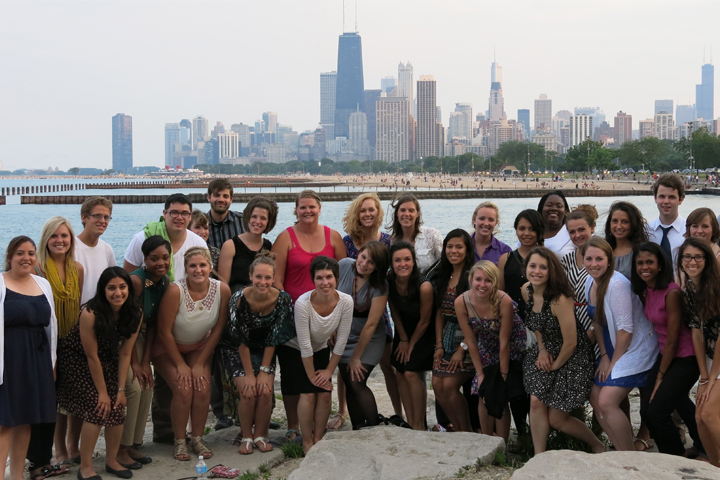“It’s far more than just a skyline.” –Kelsey Dadey ’13, elementary education and Chicago Teacher Education Pipeline alumna
When aspiring educators fail to look beyond the headlines or skylines to discover Chicago’s cultural and social wealth, they possess a deficit perspective. Reversing this trend is priority No. 1 for urban teacher preparation through the College of Education’s Chicago Teacher Education Pipeline (CTEP).
Now in its 10th year, CTEP offers teacher education majors immersive experiences in the city’s neighborhoods of Auburn-Gresham, Albany Park, and Little Village. Benefiting from CTEP’s many partnerships, preservice students live and work in these areas and gain deep understanding of how to use the community’s assets. They then incorporate their new knowledge and perspectives into their teaching practices.
Urban preparation is also woven throughout the teacher education curriculum. CTEP has assisted dozens of education faculty at the University redesign their courses with an urban focus. Through their programs and course redesign, CTEP serves more than 25 percent of all students studying education at the University.
Preparing preservice teachers to engage community in their future careers is a primary focus of Brian Horn’s work. As an assistant professor in the School of Teaching and Learning, he is among the many college faculty members whose rigorous research and program involvement support the progressive work of CTEP.
“I strongly believe that when urban teachers effectively engage students, families, community partners, and schools with the work of the community, all those involved experience more success,” Horn said.
Telling the CTEP story
Last year, Horn set out to share the urban teacher preparation stories of six CTEP alumni with the field. Together, they were able to demonstrate the value of community engagement for teachers’ future classrooms.
The alumni Horn interviewed had participated in CTEP’s four-week STEP-UP internship and subsequently a yearlong student teaching placement in a Professional Development School (PDS). Through these experiences, preservice teachers live and teach in a Chicago neighborhood, take professional development sessions and/or coursework, and engage with local community-based organizations.

From left, Sylvia Castillo, Alyssa Jones, and Brian Horn at the National Council of Teachers of English Annual Convention in November 2013.
He and the alumni then co-authored the work, and two of them—Alyssa Jones ’13 and Silvia Castillo ’13—presented the paper with Horn at the National Council of Teachers of English Annual Convention in Boston last November.
“Since much of the presentation involved their experiences and stories through STEP-UP and their PDS year, Alyssa and Silvia did most of the talking,” Horn said. “They shared anecdotes and fielded questions from the audience.”
Their topics ranged from work with community-based organizations and local citizens, to the understanding they developed of each community’s unique culture, to the credibility and rapport they gained with their students by living in their neighborhoods.
“One day, I had a student tell me, ‘You have no idea what it’s like for us around here!’ I responded by telling him that I may not know a lot about what he goes through, but I take the same bus he does and walk the same streets,” Castillo said, recounting her STEP-UP internship. “He looked at me and said, ‘You really take the bus here? You live around here?’”
She believes that early STEP-UP moment enabled her to recognize why she needed to be connected with her students’ neighborhoods to have a positive impact on classroom culture.
These thoughts were echoed by Jones.
“Living in the community, working with a community organization, and having conversations with many families is what has prepared me,” she said. “I cannot imagine going to school, teaching, and coming home each day with no understanding of what kind of lives the students are living.”
Castillo also expressed the importance of getting to know a community’s assets and bringing them into the classroom.
“I began to realize getting to know the community-based organizations could be incredible because it would form a team between school and community and we would all be fighting for the same goal: the education of our children.”
The attendees of the conference session included teachers, teacher educators, and students. Jones said she did not expect the tremendous interest their discussion generated.
“Many people wanted to ask us questions and find out more about the opportunities available through ISU and the CTEP office,” she said. “After our presentation I was shocked to see so many people coming up to us asking for contact information to learn more about what we have done.”
Positive outcomes
The positive outcomes achieved through urban teacher preparation throughout the years are truly inspiring.
CTEP reports that during the past five years, 91 percent of STEP-UP participants who begin teaching in Chicago after graduation continue to teach in the city—a significantly higher percentage than all new CPS teachers. Yet, the program is working to further improve retention and success by offering a mentoring and induction program to Illinois State teachers in their first or second year at CPS. This alumni network is continually growing and is supported by CTEP’s many school partnerships and more than 30 community-based organizations.
Indeed, Illinois State alumni recognize that Chicago is much more than a skyline. It is a diverse and vibrant collection of communities that each offer unique learning environments for students and teachers.
The impact of these experiences are put best by students and alumni like former bilingual/bicultural education major Katie Horcher ’13,
“STEP-UP planted the seed, the clinical courses nurtured it and helped it to develop into something I was able to put to use while student teaching. Now I feel that going into my first year I have had the experience and the trial runs to mesh community and education effectively in my classroom.”
Want to read the entire conference paper? Email Brian Horn.
The deadline to apply for STEP-UP‘s summer 2014 group is Friday, February 7.

